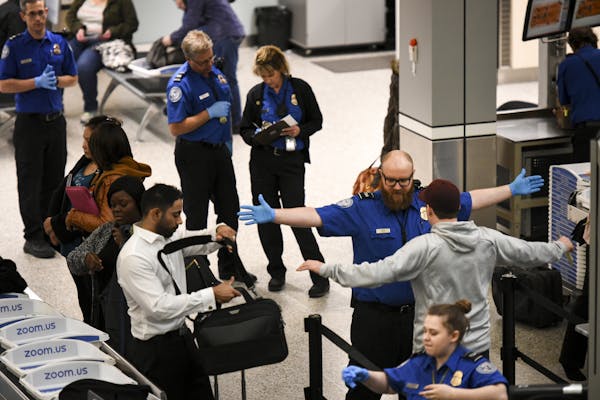Minnesota will ensure vulnerable residents continue to get services amid the federal shutdown, Gov. Tim Walz said Tuesday, but the state faces potential reimbursement fights, staff layoffs and negative economic impacts if the stalemate drags on.
As the longest shutdown in U.S. history marked its 25th day Tuesday, Walz said his staff is assessing the federal grant money the state depends on for highways, Medicaid, veterans' health care, assistance for needy families and other services. If the shutdown continues much longer, the state may have to send layoff notices to certain staff members and have legislators sign off on using state money to fund programs.
"Promises made to people should be kept," Walz said of basic services, like food assistance. "So this is our commitment to do it. As it stands right now, the state of Minnesota is prepared to continue on basically until the 15th of February."
Walz left Congress to become governor of Minnesota, but from the beginning of his new job in St. Paul the Democrat has found himself mired in the side effects of Washington, D.C., dysfunction. He debuted his shutdown plan at a news conference Tuesday, flanked by advocates for the state's neediest residents as well as state agency commissioners and legislators — both Republicans and Democrats.
The governor has not yet needed to approach the Legislature to ask for money to cover federal programs. But if he does, Walz said it will be important that the bills say the federal government is expected to reimburse state expenses. Walz's general counsel is working with Minnesota Attorney General Keith Ellison to also look at legal options to ensure Minnesota gets money back for any costs it incurs.
"We're prepared to take legal action," Ellison said, adding that his office could potentially team up with other attorneys general in a multistate lawsuit.
The governor's administration is also talking with American Indian tribes about ways to assist them during the shutdown. Walz has reached out to the state's Congress members to urge them to help Minnesotans and said he is working with governors of other states to advocate for states' needs. A statewide contingency response team is following up on these initial steps and will look at how the plan should evolve.
Walz was hesitant to assign political blame at the news conference but said federal agencies' funds should not be tied to the border security debate. House Minority Leader Kurt Daudt, R-Crown, stood alongside Walz and said they should unite on areas of agreement, like making sure the state's most vulnerable get services.
However, Republican Party of Minnesota Chairwoman Jennifer Carnahan issued a statement afterward saying Walz and Ellison should ask their Democratic friends in Washington, D.C., to negotiate.
"Unfortunately, today, Governor Walz made it clear he is not listening to Minnesotans who are calling on their elected officials to secure our border," Carnahan said.
Weighing effects
Minnesota receives about $1 billion in federal funding every month. With about a quarter of federal operations affected by the partial shutdown, the state is experiencing problems with only a portion of that money. The state is estimated to have spent tens of millions, and potentially $100 million, on federal programs where the reimbursements are tied up by the shutdown.
The large group of faith leaders, school staff and commissioners at Tuesday's news conference said the cash is critical for those who rely on programs like the Supplemental Nutrition Assistance Program, commonly known as SNAP. "Food can't wait. You know, you run out of food, 2 p.m. in the afternoon it starts getting real," Department of Human Services Commissioner Tony Lourey said, noting that the elderly, children and people with disabilities all depend on the food assistance program.
SNAP funding will continue through February, but the U.S. Department of Agriculture is issuing the benefits earlier than usual because of the shutdown. The state is trying to alert recipients that the benefits they will receive around Jan. 20 need to last through the end of next month.
The shutdown adds another level of complexity as Walz's new administration draws up its first budget proposal due in mid-February. A federal shutdown creates uncertainty and can result in an economic slowdown, Management and Budget Commissioner Myron Frans said.
"A 25-day shutdown starts to have serious negative economic consequences," he said.
If the shutdown continues, it could affect more members of the state's workforce. There are about 6,100 federal employees in Minnesota who are furloughed or working without pay.
Additionally, about 3,000 state employees are paid, at least in part, by federal dollars. Management and Budget officials are still developing a detailed breakdown of the shutdown's impacts on programs and figuring out how many of those 3,000 people might have to be laid off.
"There are a lot of decision points coming up in the very near future," Frans said.

Fact check: Walz and Vance made questionable claims during only VP debate

In Tim Walz's home city, opposing groups watch him debate on the national stage

